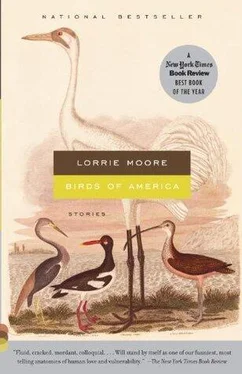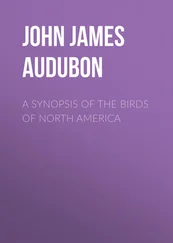I am a man upon the land, he thinks. But here at sea, what am I? Shrieking or feeding?
Quilty comes up behind him, with Guapo. “Let’s go to dinner,” he says.
“Thank you,” says Mack.
After dinner, they lie in their motel bed and kiss. “Ah, dear, yes,” murmurs Quilty, his “dears” and “my dears” like sweet compresses in the heat, and then there are no more words. Mack pushes close, his cool belly warming. His heart thumps against Quilty’s like a water balloon shifting and thrusting its liquid from side to side. There is something comforting, thinks Mack, in embracing someone the same size as you. Something exhilarating, even: having your chins over each other’s shoulders, your feet touching, your heads pressed ear-to-ear. Plus he likes — he loves — Quilty’s mouth on him. A man’s full mouth. There is always something a little desperate and diligent about Quilty, poised there with his lips big and searching and his wild unshaded eyes like the creatures of the aquarium, captive yet wandering free in their enclosures. With the two of them kissing like this— exculpatory, specificity, rubric —words are foreign money. There is only the soft punch in the mouth, the shrieking and feeding both, which fills Mack’s ears with light. This, he thinks, this is how a blind man sees. This is how a fish walks. This is how rocks sing. There is nothing at all like a man’s strong kiss: apologies to the women of Kentucky.
They eat breakfast at a place called Mama’s that advertises “throwed rolls.”
“What are those?” asks Quilty. They turn out merely to be warm buttermilk rolls thrown at the clientele by the waiters. Mack’s roll hits him squarely in the chest, where he continues to clutch it, in shock. “Don’t worry,” says the waiter to Quilty. “Won’t throw one at you, a blind man, but just maybe at your dawg.”
“Good God,” says Quilty. “Let’s get out of here.”
On the way out, by the door, Mack stops to read the missing-child posters. He does not look at the girls. He looks at the boys: Graham, age eight; Eric, age five. So that’s what five looks like, thinks Mack. Lou will be five next week.
Mack takes the slow southerly roads. He and Quilty are like birds, reclaiming the summer that left them six weeks before in the north. “I’ll bet in Tapston they’ve all got salt spats on their boots already,” says Mack. “Bet they’ve got ice chunks in their tires.” Quilty hates winter, Mack knows. The frozen air makes things untouchable, unsmellable. When the weather warms, the world comes back. “The sun smells like fire,” Quilty says, and smiles. Past the bleached doormat of old wheat fields, the land grows greener. There is cotton harvested as far north as Missouri, the fields spread out like bolts of dotted swiss, and Mack and Quilty stop on the shoulder once, get out to pick a blossom, peel back the wet bud, feel the cotton slowly dry. “See what you miss, being a Yankee,” says Mack.
“Missing is all I do,” says Quilty.
They come upon a caravan of Jeeps and Hummers painted beige and headed south for a ship that no doubt will take them from one gulf to another. Mack whistles. “Holy shit,” he says.
“What?”
“Right now, there’re about two hundred army vehicles in front of us, freshly painted desert beige.”
“I can’t bear it,” says Quilty. “There’s going to be a war.”
“I could have sworn there wouldn’t be. I could have sworn there was just going to be a television show.”
“I’ll bet there’s a war.” They drive to Cooter along with the Jeeps, then swing off to Heloise to look at the river. It is still the same slow mongoose brown, lacking beauty of some kind Mack can’t quite name. The river seems to him like a big ticky dog that doesn’t know its own filth and keeps following your car along on the side as you drive.
They get out of the car to stretch. Mack lights a cigarette, thinking of the Jeeps and the Saudi desert. “So there it is. Brown and more brown. Guess that’s all there is to a river.”
“You’re so … Peggy Lee ,” says Quilty. “How about a little Jerome Kern? It don’t plant taters. It don’t plant cotton. It just keeps rolling along.”
Mack knows the song but doesn’t even look at Quilty.
“Smell the mud and humidity of it,” says Quilty, breathing deeply.
“I do. Great humidity,” says Mack. He feels weary. He also feels sick of trying, tired of living, and scared of dying. If Quilty wants musical comedy, there it is: musical comedy. Mack drags on his cigarette. The prospect of a war has seized his brain. It engages some old, ongoing terror in him. As a former soldier, he still believes in armies. But he believes in armies at rest, armies relaxing, armies shopping at the PX, armies eating supper in the mess hall. But armies as TV-network football teams? The quick beginning of the quick end.
“I hear the other side doesn’t even have socks,” says Quilty when they are back in the car, thinking of the war. “Or rather, they have some socks, but they don’t all match.”
“Probably the military’s been waiting for this for years. Something to ace — at last.”
“Thank God you’re not still in the reserves. They’re calling up all the reserves.” Quilty reaches up under Mack’s shirt and rubs his back. “Young people have been coming into my office all month to have their wills drawn up.”
Mack was in the reserves only a year before he was thrown out for drunkenness on one of the retreats.
“The reserves used to be one big camping trip,” Mack says.
“Well, now it’s a camping trip gone awry. A camping trip with aspirations. A big hot camping trip. Kamp with a K . These kids coming in for wills: you should hear the shock in their voices.”
Mack drives slowly, dreamy with worry. “How you doing back there, Miss Daisy?” Quilty calls over his shoulder to Guapo. Outside of Memphis, on the Arkansas side, they stop at a Denny’s, next to a warehouse of dinettes, and they let Guapo out to run again.
Dinettes, thinks Mack. That’s just what this world needs: a warehouse of dinettes.
“I once tried to write a book,” says Quilty, seated cozily in his booth, eating an omelette.
“Oh, yeah?”
“Yeah. I had these paragraphs that were so huge, they went on for pages. Sentences that were also just enormous — two or three pages long. I had to shrink things down, I was told.”
Mack smiles. “How about words? Did you use big words, too?”
“Huge words. And to top it off, I began the whole thing with a letter I razored off a billboard.” He pauses. “That’s a joke.”
“I get it.”
“There was a book, though. I was going to call it Dating My Sofa: A Blind Man’s Guide to Life .”
Mack is quiet. There is always too much talking on these trips.
“Let’s hit Memphis on the way back,” says Quilty irritably. “For now, let’s head straight to New Orleans.”
“That’s what you want to do? Fine.” Mack has no great fondness for Memphis. Once, as a boy, he’d been chased by a bee there, down a street that was long and narrow and lined on one side with parked cars. He’d ducked into a phone booth, but the bee waited for him, and Mack ended up stepping out after twenty minutes and getting stung anyway. It wasn’t true what they said about bees. They were not all that busy. They had time. They could wait. It was a myth, that stuff about busy as a bee.
“That way, coming back,” adds Quilty, “we can take our time and hit the Peabody when the ducks are out. I want to do the whole duck thing.”
“Sure,” says Mack. “The duck thing is the thing.” On the way out of Denny’s, Mack pulls slightly away from Quilty to look at another missing-child poster. A boy named Seth, age five. The world — one cannot drive fast or far enough away from it — is coming at him in daggers.
Читать дальше












